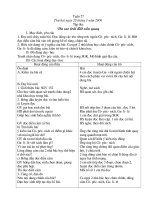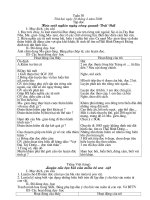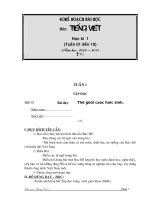- Trang chủ >>
- Đề thi >>
- Đề thi lớp 8
tiếng anh 5 tuần 3
Bạn đang xem bản rút gọn của tài liệu. Xem và tải ngay bản đầy đủ của tài liệu tại đây (94.03 KB, 6 trang )
<span class='text_page_counter'>(1)</span><div class='page_container' data-page=1>
<b>Date of planning: 14/9/ 2016 Week :3</b>
<b>Date of teaching: 19 – 23/ 9/2016 Period 9th</b>
<b>Unit 2: I always get up early. How about you?</b>
<b>Lesson 2: (1,2,3)</b>
<b>I. Objectives:</b>
By the end of the lesson, Ss will be able to:
- Ask and answer about frequency
- Develop Ss’ speaking and reading skills
<b>II. Language focus: </b>
Pattern: How often do you….? – I………… every day/ once/ twice a week/ month
Voc.: partner, project, look for, surf, information, get dressed, once, twice
<b>III. Teaching aids:</b>
Pictures, textbook, projecter …
<b>III. Procedure:</b>
<b>Teacher’s and Ss’ activities</b> <b>Content</b>
<b>A. Warm-up:</b>
- Sing the song “This is the way we do things”
<b>B. Presentation:</b>
* Vocabulary:
- T follows the steps of presenting new
words.
- Ss follow T’s instructions
* Dialogue:
- T shows the pictures on the bb and play the
CD
- Ss look and repeat the dialogues 3 times
- T calls on some Ss to read
- Ss work in pairs in 2 minutes to practice
- Some pairs read aloud
- T corrects pronunciation
partner, project, look for, surf, information,
get dressed, once, twice
<i>1. Look, listen and repeat:</i>
<b>C. Practice:</b>
- T gives out the pattern and explain how to
use
- Ss copy the pattern
- T introduces the picture cues and guides Ss
<i>2. Point and say:</i>
How often do you….?
</div>
<span class='text_page_counter'>(2)</span><div class='page_container' data-page=2>
how to ask and answer using the cues
- Ss work in pairs to practice
- Get feedback
- T ask some pairs to read aloud
<b>D. Production:</b>
- T asks some pairs to stand up and practice
speaking basing on their real information
- Other Ss observe and say their comments
<i>3. Let’s talk:</i>
S1: What’s do you do in the morning/
afternoon/ evening?
S2: – I always/ usually/ often/ sometimes/
never …..
S1: How often do you….?
S2: I………… every day/ once/ twice a
week/ month
<b>E. Homelink:</b>
- T tells the homework and Ss take notes - Learn new words and practice the
structures
- Prepare for new lesson: Unit 2 Lesson 2:
4,5,6
<b>Date of planning: 14/9/ 2016 Week :3</b>
<b>Date of teaching: 19 – 23/ 9/2016 Period 10th</b>
<b>Unit 2: I always get up early. How about you?</b>
<b>Lesson 2: (4,5,6)</b>
<b>I. Objectives:</b>
By the end of the lesson, Ss will be able to:
- Listen and number the pictures
- Write about someone’s daily routine and do crossword
<b>II. Language focus: </b>
Pattern: How often do you….? – I………… every day/ once/ twice a week/ month
Voc.: partner, project, look for, surf, information, get dressed, once, twice
<b>III. Teaching aids:</b>
Pictures, textbook, projecter, CD …
<b>III. Procedure:</b>
<b>Teacher’s and Ss’ activities</b> <b>Content</b>
<b>A. Warm-up:</b>
</div>
<span class='text_page_counter'>(3)</span><div class='page_container' data-page=3>
get dressed, once, twice
<b>B. Presentation:</b>
* Dialogue:
- Some pairs ask and answer about their
hometown
- T corrects pronunciation
S1: What’s do you do in the morning/
afternoon/ evening?
S2: – I always/ usually/ often/ sometimes/
never …..
S1: How often do you….?
S2: I………… every day/ once/ twice a
week/ month.
<b>C. Practice:</b>
- T shows the gap-fill on and guides .
- T elicits the dialogue, play the CD several
times
- Ss listen and number the pictures
- 4 Ss go to the board and write the answers
- Others give comments
- Have Ss read the instruction
- T asks Ss to do the task in 5 minutes. T
goes round for help if necessary
- 2 Ss write on the board
- Correct mistakes
- T emphasizes some main points
- Do choral and individual repetition
<i>4. Listen and number:</i>
Key:
1. b
2. c
3. d
4. a
<i>5. Write about you:</i>
1. What do you do in the morning?
2. What do you do in the afternoon?
3. Do you go to bed early in the evening?
4. How often do you watch TV?
<b>D. Production:</b>
- T guides Ss to play the game
- Ss listen and play
<i>6. Let’s play</i>
Crossword puzzle
<b>E. Homelink:</b>
- T tells the homework and Ss take notes
- Learn new words and practice the
structures
- Prepare for new lesson: Unit 2 Lesson 3:
1,2,3
<b>Date of planning: 14/9/ 2016 Week :3</b>
<b>Date of teaching: 19 – 23/ 9/2016 Period 11th</b>
</div>
<span class='text_page_counter'>(4)</span><div class='page_container' data-page=4>
<b>Lesson 3: (1,2,3)</b>
<b>I. Objectives:</b>
By the end of the lesson, Ss will be able to:
- Listen and repeat words, listen and circle
- Do the chant “What do you do in the morning?”
- Develop Ss’ reading and listening skills
<b>II. Language focus: </b>
Pattern: Where do you live? – I live …. What’s do you do in the morning/ afternoon/
evening?– I always/ usually/ often/ sometimes/ never …..
<b>III. Teaching aids:</b>
Pictures, textbook, projecter …
<b>III. Procedure:</b>
<b>Teacher’s and Ss’ activities</b> <b>Content</b>
<b>A. Warm-up:</b>
- Play a game Bingo
<b>B. Presentation:</b>
- T recalls vocabulary
- Ss follow T’s instruction
- T shows the words and models the stress
- Ask Ss to repeat the words
<i>1. Listen and repeat:</i>
‘always I always get up early.
‘usually I usually have dinner at home.
‘often I often go to bed early.
‘sometimes I sometimes go swimming on
Sundays.
<b>C. Practice:</b>
- T shows the gap-fill on and guides .
- T elicits the sentences, play the CD several
times
- Ss listen and fill the gaps by circling
- 3 Ss go to the board and circle the answers
- Others give comments
- Practice reading
<i>2. Listen and circle a or b. Then say the </i>
<i>sentences aloud.:</i>
Key:
1. a
2. b
3. a
4. b
</div>
<span class='text_page_counter'>(5)</span><div class='page_container' data-page=5>
- T shows the chant on the board, plays the
CD 3 times and guides Ss how to do the
chant sentence by sentence
- Ss follow T’s instruction
- The whole class practice
- Some Ss do chanting in front of the class
<b>What do you do in the morning?</b>
What do you do in the morning?
I always brush my teeth.
What do you do after getting up?
I usually go to school.
How often do you go to the library?
I go there once a week.
How often do you play computer games?
I play them every week!
<b>E. Homelink:</b>
- T tells the homework and Ss take notes - Practice reading the words and the chant
- Do exercise in Work book.
- Prepare for new lesson: Unit 2 Lesson 3:
4,5,6
<b>Date of planning: 14/9/ 2016 Week :3</b>
<b>Date of teaching: 19 – 23/ 9/2016 Period 12th</b>
<b>Unit 2: I always get up early. How about you?</b>
<b>Lesson 3: (4,5,6)</b>
<b>I. Objectives:</b>
By the end of the lesson, Ss will be able to:
- Read and answer about one’s hometown
- Review the lesson
- Develop Ss’ reading and writing skills
<b>II. Language focus: </b>
Pattern: Where do you live? – I live ….
<b>III. Teaching aids:</b>
Pictures, textbook, projecter …
<b>III. Procedure:</b>
<b>Teacher’s and Ss’ activities</b> <b>Content</b>
<b>A. Warm-up:</b>
- Do the chant “What do you do in the morning?”
<b>B. Presentation:</b>
</div>
<span class='text_page_counter'>(6)</span><div class='page_container' data-page=6>
- Check vocabualary
<b>C. Practice:</b>
- T elicits the text
- Ask some Ss to read the text
- T corrects pronunciation
- Ss work in pairs to discuss the answers
- Get feedback, some Ss tick Y or N on the
board. The others give comments.
- T shows correct answers
- T explains the task and gives some clues
- Ss work individually to write about their
friends
- T goes round for help
- 2 Ss write on the board
- T and other Ss give comments
<i>4. Read and answer:</i>
Answer key:
1. She gets up early and usually goes
jogging in the morning.
2. After school, she usually does her
homework.
3. She watches English for Kids once a
week.
4. She goes shopping once a week.
<i>5. Write about your day:</i>
My name is …………
In the morning, I always ………..
In the afternoon, I usually ………
In the evening, I ………..
I ………
<b>D. Production:</b>
- T explains the the task
- Ss draw a house in their paper
<i>6. Project:</i>
Interview two of your classmates about their
daily routines.
<b>E. Homelink:</b>
- T tells the homework and Ss take notes
- Do task 7 page 17: colour the stars to
evaluate your skills
- Practice reading and writing at home
- Do exercise in Work book.
</div>
<!--links-->









